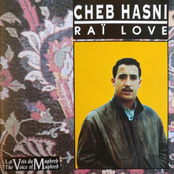Raï Love

Biography
Cheb Hasni (born Hasni Chekroun on February 1, 1968 in Oran, Algeria, died September 29, 1994) was a performer of Algerian Raï music. He is popular across North Africa, having reached the height of his career in the late 1980s and early 1990s. He was the son of a welder and grew up in a working class family where he was one of seven children. Hasni is most well known for his love songs, but he also dealt with taboo subjects such as divorce and alcohol. Beginning of Career Cheb Hasni was inte...
Cheb Hasni (born Hasni Chekroun on February 1, 1968 in Oran, Algeria, died September 29, 1994) was a performer of Algerian Raï music. He is popular across North Africa, having reached the height of his career in the late 1980s and early 1990s.
He was the son of a welder and grew up in a working class family where he was one of seven children. Hasni is most well known for his love songs, but he also dealt with taboo subjects such as divorce and alcohol.
Beginning of Career
Cheb Hasni was interested in performing from an early age. In an interview published in the French newspaper Libération in 1992, Hasni recounted how "everyone knew me in our neighbourhood when I was a kid. I was always walking up the road with my school bag thrown off my shoulder, singing my head off." Hasni was also talented in football and a good student, but these traits were overshadowed by his musical interests.
Hasni's first significant performance as a singer occurred when he attended a local wedding party, where the group led by the famous Naoui brothers was playing. Impressed by his voice, they invited him to perform on stage at a well-known cabaret, La Guinguette.
The second major launching point in Hasni's career came shortly afterwards when a producer asked him to record with Raï performer Chaba Zahouania. During the summer of 1987 the pair recorded a provocative song by Algerian standards, "Beraka" ("The Shack"), gaining them much attention. The subjects of his songs were controversial and made the song popular with Algerian youth, who contributed to the song's estimated sales of one million copies. The success of "Beraka" made Hasni famous, and a controversial subject with both critics and Islamic fundamentalists already concerned over the popularity of the Raï genre. Another major hit was "El Visa" a song about migration, which sold approximately 250,000 cassettes in 1992.
Fame
Like many other Raï artists based in Algeria, Cheb Hasni spent more time performing abroad (giving concerts everywhere from Paris, Marseilles and Boston to Tunis, Casablanca and Tokyo) than at home, due to curfews and musical restrictions in Algeria at the time. Hasni’s last concert in his native country was on 5 July 1993, when he performed to an audience of over 150,000 fans in Algiers at an event organised to celebrate Algerian independence.
Hasni became one of the most prolific artists on the Raï scene, recording around 100 cassettes during his career. His distinctive "Raï love" style soon inspired imitators, notably Cheb Nasro, who launched his career in 1988 with the hit "Pour te faire plaisir".
Death
Hansi's fame and controversial songs led to his receiving death threats from assorted people and groups. His primary residence remained in Oran, even though his family lived in the safer environment of France. On September 29, 1994, he was murdered outside his parents' home in Oran. His death came amid other violent actions against notable North African performers. A few days before his death, Kabylian singing star Lounès Matoub was abducted by a commando from the GIA. The following year, on February 15, 1995, Raï producer Rachid Baba-Ahmed was assassinated in Oran. Read more on Last.fm. User-contributed text is available under the Creative Commons By-SA License; additional terms may apply.
